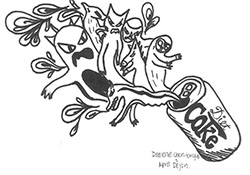
The art of public schooling operates in two primary mediums: intellectual proliferation and the cultivation of a social and physical health. Our perception of at least one of these is currently at fault.
As it stands at present, I can attest that the vast majority of public opinion would argue in favor of the sentiment that defends diet sodas as a “healthier” alternative to regular pop. I say, pick your poison, but in terms of popular belief, the claim that diet beverages are a responsible substitute to the conventional form is a common supposition. Under recent guise, this assumption has bled influence into the sector of education, as in an agreement brokered by the Alliance for a Healthier Generation in 2002, industry leaders such as Coca-Cola Co., Cadbury Schweppes PLC, ad PepsiCo Inc. concurred that they would no longer market regular sodas to public and private schools.
From my perspective, which I will assure you has been enlightened by fact, the implementation of artificially sweetened soft drinks, especially in the domain of youth, is one of the most untenable detriments to public health.
Every form of subsistence that exists by means of nature is intrinsically fashioned to suit our body’s physical needs. I will contend further that if in fact our environment has provided us with a perfect nutritional fortress, it is only logical to surmise that those who stand to challenge these provisions will be met with some degree of resistance. Artificial sweeteners such as those found in diet sodas are not exempt from this principle.
First of all, there’s nothing “diet” about them. According to a study published by Purdue University in July 2013, researchers found that the consumption of artificially sweetened beverages, such as those offered in the school cafeteria and vending machines, is closely associated with obesity. The assertion is built upon a number of medical findings, all of which are contingent of the fact that sugar substitutes disrupt the body’s natural ability to regulate calorie intake. Because artificial sweeteners can be hundreds of times sweeter than regular sugar, drinking diet soda causes a person’s body to construct a saccharine tolerance, so to speak, inducing frequent and intense cravings for sugar (or a sweet alternative) more than any other substance. To further this contention, population studies published in the American Journal of Clinical Nutrition in 2006 have shown that there was a 200 percent increased risk of obesity in those who drank diet soda.
Perhaps the most injurious facet of the diet brigade is that very thing which attributes most to its appeal: a lack of calories. As evidenced by a study conducted by the University of Texas Health Science Center in 2005, although the artificial sugars in diet sodas satisfy a person’s craving for a sweet flavor, the problem is that fake sugars trick your body into thinking that what it is receiving is legitimate, but because chemically speaking this is not the case, it confuses your metabolism and natural response. Accordingly, when you do ingest real sugar, your body is no longer sure of how to process it, thus inspiring weight gain.
To quote CNN diet and fitness expert Dr. Melina Jampolis, “research shows that sweet taste can increase appetite and the regular consumption of the high intensity sweetness of artificial sweeteners may encourage sugar cravings and dependence.”
Let’s just say the war on substantive sugar is a hollow one.
But just wait, there’s more! In an 11-year-long Harvard Medical School study, researchers found that drinking diet cola is linked with a two-fold inflated risk for kidney decline. Additionally, it was discovered that the consumption of just one diet soda a day is associated with a 34% increased chance of metabolic syndrome, which is linked to high cholesterol, heart disease, and stroke.
Okay, so maybe high cholesterol isn’t an immediate concern for the majority of the high school population, but that’s not to say that health consciousness in one’s youth or the manifestation of healthy practices should rest compromised on the basis of a misconception. I’m not saying you have to cut diet soda or artificial sweeteners out of your life completely, but I would definitely advocate moderation. It may be under regulation of a superior authority that mandates the current diet regime, but backed by fact and the consolation of a healthier future, it’s easy to make the personal choice against a daily Diet Coke.











